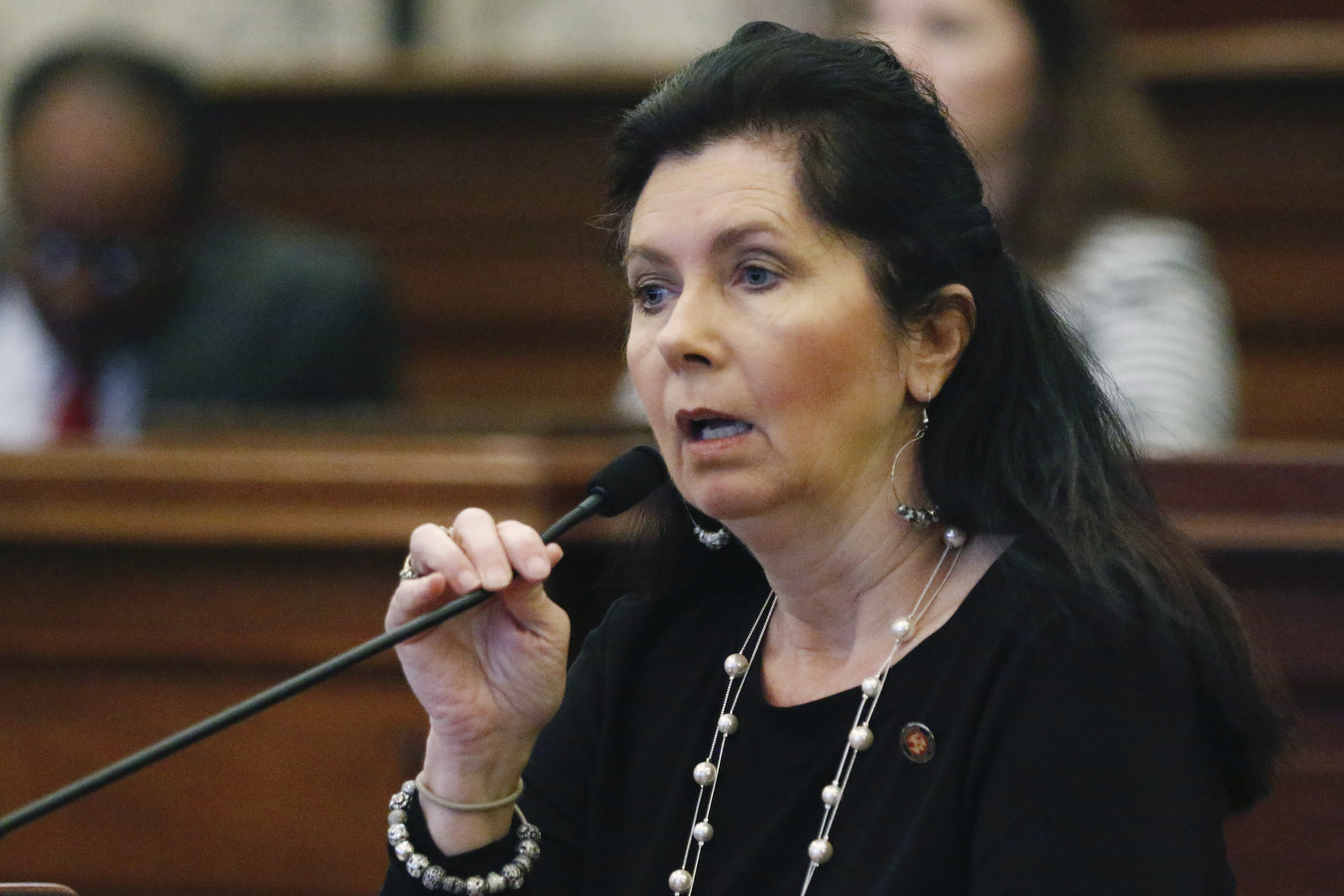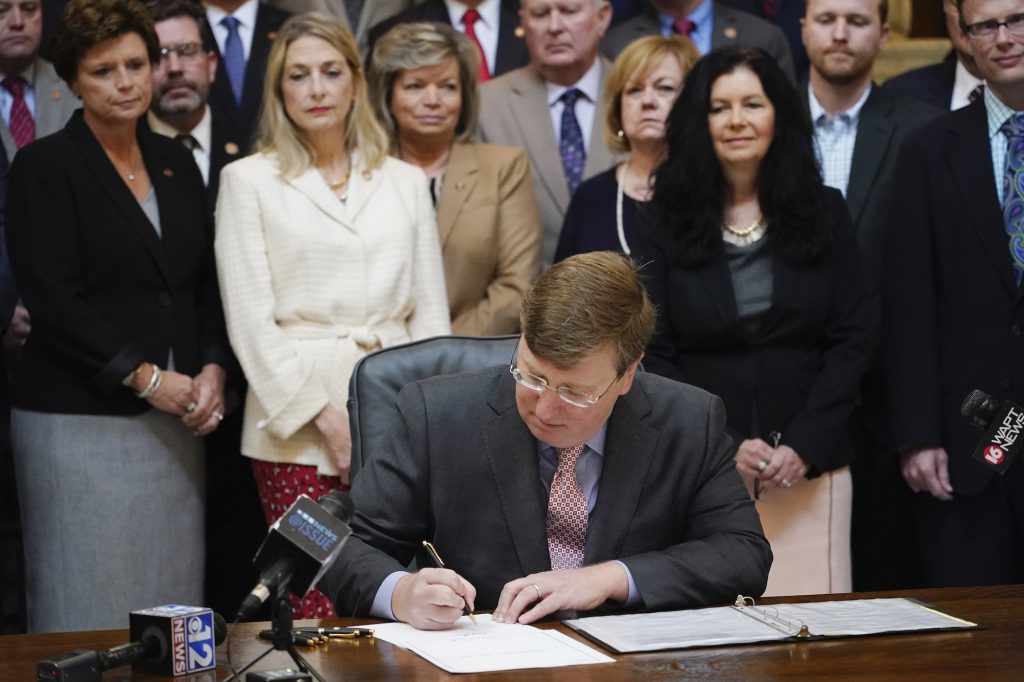Mississippi could lose out on college championships and millions in revenue after Gov. Tate Reeves signed a law effectively banning transgender athletes from high school and college sports. The NCAA said today that it is examining future plans for championships in states that have passed or are considering trans exclusionary laws.
“The NCAA Board of Governors firmly and unequivocally supports the opportunity for transgender student-athletes to compete in college sports,” the organization said. “This commitment is grounded in our values of inclusion and fair competition. … When determining where championships are held, NCAA policy directs that only locations where hosts can commit to providing an environment that is safe, healthy and free of discrimination should be selected.”
The move comes less than a year after lawmakers retired the state’s 1894 Confederate-themed state flag, partly in response to pressure from the National Collegiate Athletic Association and other sports leagues who said they would not hold championships in Mississippi unless the state retired the Lost Cause symbol.
‘The Mississippi Fairness Act’
With the lieutenant governor and Mississippi House speaker surrounding him, Gov. Reeves signed Senate Bill 2536, titled “The Mississippi Fairness Act,” into law last month, claiming it would “ensure young girls are not forced to compete against biological females.” When asked if he could cite any examples of that being an issue in Mississippi, he could not.
“I can’t personally give you any examples, but that’s the reason the Fairness Act is in place—to ensure it doesn’t happen in the future,” he said.
The law bars transgender athletes from playing on teams that correspond with their gender identity, meaning transgender boys and men may only participate in school sports if they play on girls’ or women’s teams; transgender girls and women must play on boys’ or men’s teams.
Supporters of the law did not address the fact that transgender individuals often undergo hormone replacement. One study in the British Journal of Sports Medicine “found that between one to two years of hormone-replacement therapy was sufficient to allow equitable competition between trans-women and cis-women even at elite Olympic levels, to say nothing of high-school level sports.”
Practically, that means Mississippi’s law could have the effect of placing transgender boys and men on girls’ and women’s teams—even if their strength and physical performance is equal to that of cisgender male athletes.
In 2017, Texas high school student Mack Beggs, a transgender teen boy, made headlines after he dominated in high school wrestling, winning back-to-back 6A 110-pound girls’ wrestling state championships. The teenage wrestler had been forced to compete on girls’ teams because a University Interscholarstic League Policy, approved by state superintendents, required transgender students to compete on teams that matched the gender they were assigned at birth.
Because Beggs was assigned female at birth, the league restricted him to compete only against girls—despite the fact that he had been undergoing hormone-replacement therapy, resulting in him having strength akin to a cisgender boy his age. Like the Texas UIL policy, Mississippi’s new law could similarly require transgender teen boys like Beggs to participate only on girls’ teams, potentially producing the exact scenario Reeves and other supporters of the new law said it was needed to avoid.
‘Inclusion and Fairness Can Coexist’
In an April 9 press release, Human Rights Campaign President Alphonso David said the nation is at “a moment of national crisis where the rights and the very existence of transgender young people are under attack.”
“These bills are nothing more than a coordinated effort from anti-LGBTQ extremists spreading fear and misinformation about transgender people in order to score cheap political points,” he said.

Arkansas, Tennessee and West Virginia have also adopted anti-trans laws in recent weeks. Additional states are considering other anti-trans measures. Some bills in other states are functionally identical to the Mississippi law, which was itself based on a 2020 Idaho bill that the anti-LGBTQ Alliance Defending Freedom helped lawmakers there write. The Southern Poverty Law Center has classified the ADF as “a hate group”—a charge the organization disputes.
In its statement today, the NCAA noted that it has “a long-standing policy that provides a more inclusive path for transgender participation in college sports” that “requires testosterone suppression treatment for transgender women to compete in women’s sports.” The policy, the organization says, “embraces the evolving science on this issue and is anchored in participation policies of both the International Olympic Committee and the U.S. Olympic and Paralympic Committee.”
“Inclusion and fairness can coexist for all student-athletes, including transgender athletes, at all levels of sport. Our clear expectation as the Association’s top governing body is that all student-athletes will be treated with dignity and respect. We are committed to ensuring that NCAA championships are open for all who earn the right to compete in them,” the organization said.
But the association has not yet decided to blacklist Mississippi or any other state.
“The Board of Governors continues to monitor the situation and has not made a decision regarding championships,” NCAA associate Director of Communications Michelle Brutlag Hosick said after the Mississippi Free Press asked for clarification on what today’s announcement means for the state.
‘I Am Not A Threat To Women’s Sports’
Today’s statement from the NCAA follows a public-pressure campaign from WNBA and NCAA coaches and athletes, Catholic clergy and other supporters of transgender rights.
“As a trans athlete, first of all, I am not a threat to women’s sports because I am a woman. The joy and beauty of finally embracing myself and being in a sport that I love and being on that line with the women I’m supposed to be with, it’s enlightening,” CeCé Telfer, a former NCAA champion and transgender athlete, said in a statement with the Human Rights Campaign on April 9.
In the same statement, Zooey Zephyr, who was a transgender athlete at her high school in Montana, said all kids “deserve opportunities to become better athletes and better people.”
“I can with the utmost certainty say that I am the woman I am today thanks to the sports I played in my youth and the sports I continue to play in adulthood. Trans girls are girls. Trans boys are boys,” she said.









